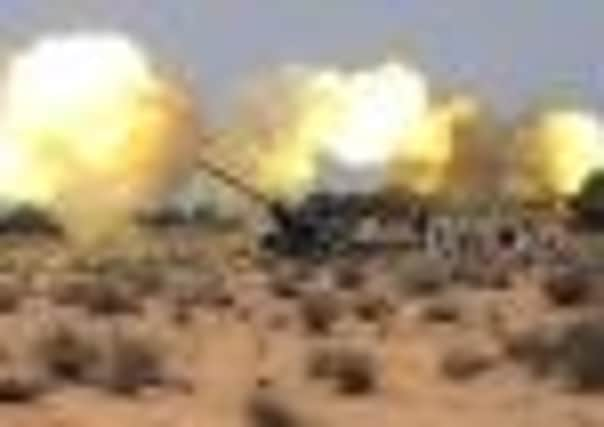Monty and Rommel can’t help me, says leader of Libya’s unruly rebels


In recent days, Major General Suleiman Mahmoud has swapped his Tripoli office for the front line as he assumed personal command of the battle to capture Sirte, the last of Colonel Muammar al-Gaddafi’s coastal strongholds.
Days of fighting, backed by Nato airstrikes, have failed to dislodge fanatical loyalists dug in in the city centre and in beachfront villas. Rebels from the city of Misrata, who are leading the attack, have lost at least 44 dead and 213 wounded.
Advertisement
Hide AdAdvertisement
Hide AdMaj Gen Mahmoud spoke in crisp English as he relaxed in the armchair of Misrata’s only luxury hotel, the Baraka, which escaped the shelling that left many of the surrounding streets in ruins.
He said he rated Field Marshal Erwin Rommel, the Desert Fox, more highly than British commander Field Marshal Bernard Montgomery, saying the German did more with less during the three-year desert campaign in which Monty’s Desert Rats finally prevailed. But he said copying Rommel was a non-starter.
“This is a different war, sir,” he said. “They don’t obey orders,” he declared of the rebel brigades now surrounding Sirte, a collection of more than 6,000 fighters who formed themselves into brigades around neighbourhoods or groups of friends initially to defend the city from Col Gaddafi’s tanks.
He added, with a sigh: “You can’t control them. I can’t write my orders and say retreat. They will not retreat. When they want to retreat they will do it.
“But they are brave fighters. Their morale is high.”
The lack of central control is becoming a chronic problem as Libya’s rebel forces try to reduce Sirte, Bani Walid and Sabha, the three remaining pro-Gaddafi holdouts that stand between the rebels and total victory.
Around Sirte more than 30 brigades, each taking orders from their individual commanders, have surrounded the city and captured outlying suburbs, the coastal highway and the hinterland.
But attacks into the city itself have suffered from traffic jams – the brigades travel in hundreds of armed pick-up trucks, and at the main junction into Sirte, one exhausted logistics officer said the front line was too narrow for everyone to be deployed at once.
Instead, the battle for Sirte is a “come-as-you-are” affair, with rebel units rotating in and out to blast at Col Gaddafi bastions. The lack of co-ordination means artillery fire cannot be brought to bear and rebel casualties are rising – this weekend saw one of Misrata’s most heralded commanders, Ibrahim Halbus, leader of the Halbus brigade, shot and paralysed.
Advertisement
Hide AdAdvertisement
Hide AdAnother problem confronting Maj Gen Mahmoud is simmering resentment in Misrata that the city, Libya’s third largest, has been given no places in the army command, or Military Council, of the ruling National Transitional Council. This is despite the fact that at both Bani Walid and Sirte, it is Misrata’s brigades – better armed, more experienced, and highly motivated than the NTC’s own soldiers – who are in the vanguard.
Maj Gen Mahmoud was at pains to say that will change, promising Misratans would find places on a new government that must be more inclusive – and less dominated by figures from Benghazi – if it is to win acceptance among all Libyans.
For now Maj Gen Mahmoud – who was the first army general to side with the revolution back in February– is concentrating on reducing Sirte. The general insisted he would try negotiations first, but if not, the war would grind on, this time with artillery and rockets being used against loyalist units. “We will win this war for freedom,” he said.